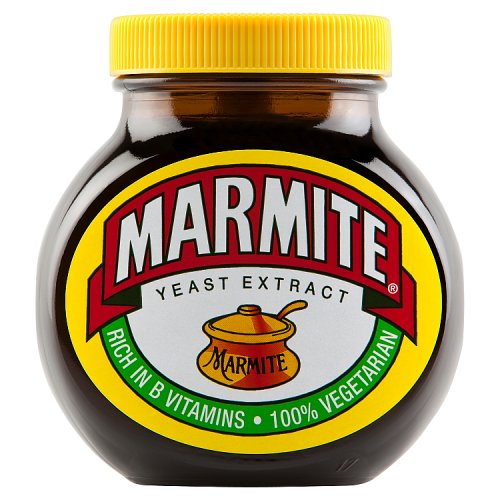Beyond the Joke, when reviewing last year’s comedy offerings, wrote that “[Ricky] Gervais might be a Marmite comedian but the success of Humanity shows that a hell of a lot of people love Marmite. Politically challenging, controversial but also laugh out loud funny.” Brits will confirm that many plays and musical theater productions (in the UK, not anywhere else) get tagged these days as “Marmite shows”. What does that mean? And is there a connection with the Marmite name’s origin? [Update, March 8: Thanks to a hat-tip from John Leake on Glosso’s Facebook page, we’ve also got the origin of Bovril — Marmite’s cousin: scroll to the bottom to see its etymology.]
Anyone who knows or has ever tasted Marmite either loves it or hates it. The foodstuff even markets itself with the slogan “Love it or hate it.” So it’s not hard to understand why the name has developed its increasingly popular colloquial meaning, which (according to Oxford Dictionaries) is “used in reference to something that tends to arouse strongly positive or negative reactions rather than indifference.”*
But hang on a minute: There’s a strange coincidental connection between the name of the yeasty spread and its reputation for polarizing opinions. That is, the “love it or hate it” aspect of the growing-up spread is weirdly suggested by the original meaning of its name. First let’s take a closer look at the product itself. The image on the front of the jar shows a “marmite”: that’s the French term for a large covered earthenware or metal cooking pot; the word landed in English as British regional and military slang to describe a cooking pot of metal or earthenware — a kind of stockpot. (Marmite was originally supplied in earthenware pots, but since the 1920s it’s been sold in glass jars.) Now look up the origin of the word marmite, and you might get a little surprise. It dates backs to 19th-century French, from the Old French marmite, which means “hypocrite.” Hmm! And as Oxford English Dictionary goes on to explain, it means hypocrite “on the grounds that it conceals its contents, is not convincing.”
I wonder if the Marmite Food-extract Company Ltd realized in 1902 when it created and named the peculiar food paste that the yellow-lidded pot would never be able to convince us all …
***
Origin of the name Bovril, Marmite’s cousin:
According to BBC Stoke & Staffordshire in 2009: “The name Bovril comes from an unusual word its inventor John Lawson Johnston found in a book. He found ‘vril’, which means ‘an electric fluid’, and he combined it with the first two letters of the Latin word for beef ‘bos’.”

